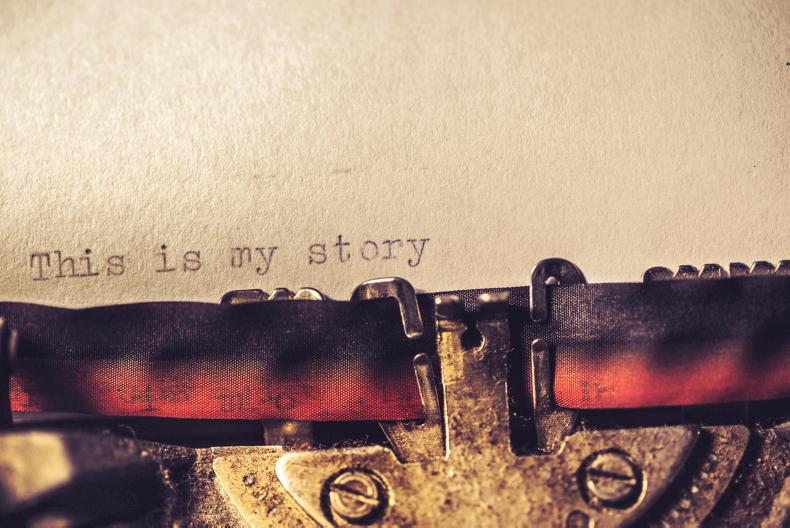Maybe the biggest question that comes up when people start to think of writing memoir is how truthful to be in the writing and can they really tell a story that involves others and has implications for them.
This is the ethical crux of the form and I think you must make your own peace with it early on in the process. Scottish writer Kerry Hudson, who wrote a memoir, Lowborn, of growing up in poverty in Scotland, said that she made the decision from the start not to use anyone’s actual name. That was her way of giving herself the freedom to be truthful while not causing hurt to anyone.
Many people ultimately decide that if people are still alive, about whom they are going to be critical, or just honest, they will write but not publish during the person’s lifetime. Another option is to fictionalise instead – turn your story into a short story or novel so that it is at a remove from your own life.
Changed mind
The issue of truth in memoir is something that I have changed my own mind on since I first started writing. When I was younger, I had a kind of zeal in believing that writing was sacrosanct and it was the writer’s right to write what they would, that this overrode any consideration of feelings in others. Now I feel that was wrong-headed. And so, there are things I wrote in my first collection which I would not write in quite the same way if I was doing it now. Sometimes it takes someone from outside the world of writing to bring this home to you and it can be particularly easy to forget the impact of words if, as with a lot of writers, you are writing about a place you no longer live in and people who are no longer part of your life.

Poet, creative writing teacher and memoir mentor, Maureen Boyle. \ Lindsay Allen
I once did a Thought of the Day on BBC Radio Ulster about a woman who lived in the town near where I grew up and how her eccentric dress earned her a nickname, so that when I was heading out in strange garb as a teenager, perhaps in one of my father’s old shirts and barefoot to do a reading at Mass, my mother would say, “You look like X”. I sort of loved the epithet and I love how in a small town such nicknames have meanings that don’t translate beyond them and that I think was the theme of the piece. But then I was back in the library of the town to do some research and the librarian happened to mention the story and that the woman was still alive. Somehow, I had thought of her as being from another time and not a living, breathing person who my story could hurt.
Potential to cause hurt
American comedian and author David Sedaris uses a particularly personal form of memoir in his work – the diary. He has kept a diary since 1977 and he was discovered first when he read an extract from it on American radio. Famously, in an essay that became a title for one of his collections, Me Talk Pretty One Day, published first in Esquire in 2007, he lampooned his adult French teacher who he encountered in Paris as someone cold, cruel and terrifying. You can see in the essay that once he gets started, he is enjoying himself in recollecting the humiliations meted out to him and others in the class.
“‘I hate you,’ she said to me one afternoon. Her English was flawless. ‘I really, really hate you.’ Call me sensitive, but I couldn’t help taking it personally.”
And elsewhere: “It was mid-October when the teacher singled me out, saying, ‘Every day spent with you is like having a caesarean section.’”
The essay’s title, by the way, came from this exchange.
“Huddled in the smoky hallways and making the most of our pathetic French, my fellow students and I engaged in the sort of conversation commonly overheard in refugee camps.
‘Sometimes me cry alone at night.’
‘That is common for me also, but be more strong, you. Much work, and someday you talk pretty. People stop hate you soon. Maybe tomorrow, okay?’”
But years later, a letter arrived at Esquire saying that the piece had been a bombshell in the Alliance Française, where he had taken lessons and he confided to his diary:
“‘I meant it at the time, but since then things have changed. She’s still moody, but I think she’s a good teacher. I can see that now, whereas I couldn’t before.”
He regrets having, “failed to mention her wit, and her skill as a teacher.”
For this month’s prompt, I’d like you to think of some thing or person about whom you had strong feelings as a child or young person, but for whom your feelings have modified with time. Write a piece in which you incorporate both positions and some reflection on what caused your change of heart or opinion.
Maureen Boyle is a poet and memoir mentor with the Irish Writers’ Centre.
If you would like to share a piece of work inspired by this exercise for possible publication, please email maria@farmersjournal.ie
Read more
Memoir: using an old photograph as a writing prompt
Memoir series: a sense of place
Maybe the biggest question that comes up when people start to think of writing memoir is how truthful to be in the writing and can they really tell a story that involves others and has implications for them.
This is the ethical crux of the form and I think you must make your own peace with it early on in the process. Scottish writer Kerry Hudson, who wrote a memoir, Lowborn, of growing up in poverty in Scotland, said that she made the decision from the start not to use anyone’s actual name. That was her way of giving herself the freedom to be truthful while not causing hurt to anyone.
Many people ultimately decide that if people are still alive, about whom they are going to be critical, or just honest, they will write but not publish during the person’s lifetime. Another option is to fictionalise instead – turn your story into a short story or novel so that it is at a remove from your own life.
Changed mind
The issue of truth in memoir is something that I have changed my own mind on since I first started writing. When I was younger, I had a kind of zeal in believing that writing was sacrosanct and it was the writer’s right to write what they would, that this overrode any consideration of feelings in others. Now I feel that was wrong-headed. And so, there are things I wrote in my first collection which I would not write in quite the same way if I was doing it now. Sometimes it takes someone from outside the world of writing to bring this home to you and it can be particularly easy to forget the impact of words if, as with a lot of writers, you are writing about a place you no longer live in and people who are no longer part of your life.

Poet, creative writing teacher and memoir mentor, Maureen Boyle. \ Lindsay Allen
I once did a Thought of the Day on BBC Radio Ulster about a woman who lived in the town near where I grew up and how her eccentric dress earned her a nickname, so that when I was heading out in strange garb as a teenager, perhaps in one of my father’s old shirts and barefoot to do a reading at Mass, my mother would say, “You look like X”. I sort of loved the epithet and I love how in a small town such nicknames have meanings that don’t translate beyond them and that I think was the theme of the piece. But then I was back in the library of the town to do some research and the librarian happened to mention the story and that the woman was still alive. Somehow, I had thought of her as being from another time and not a living, breathing person who my story could hurt.
Potential to cause hurt
American comedian and author David Sedaris uses a particularly personal form of memoir in his work – the diary. He has kept a diary since 1977 and he was discovered first when he read an extract from it on American radio. Famously, in an essay that became a title for one of his collections, Me Talk Pretty One Day, published first in Esquire in 2007, he lampooned his adult French teacher who he encountered in Paris as someone cold, cruel and terrifying. You can see in the essay that once he gets started, he is enjoying himself in recollecting the humiliations meted out to him and others in the class.
“‘I hate you,’ she said to me one afternoon. Her English was flawless. ‘I really, really hate you.’ Call me sensitive, but I couldn’t help taking it personally.”
And elsewhere: “It was mid-October when the teacher singled me out, saying, ‘Every day spent with you is like having a caesarean section.’”
The essay’s title, by the way, came from this exchange.
“Huddled in the smoky hallways and making the most of our pathetic French, my fellow students and I engaged in the sort of conversation commonly overheard in refugee camps.
‘Sometimes me cry alone at night.’
‘That is common for me also, but be more strong, you. Much work, and someday you talk pretty. People stop hate you soon. Maybe tomorrow, okay?’”
But years later, a letter arrived at Esquire saying that the piece had been a bombshell in the Alliance Française, where he had taken lessons and he confided to his diary:
“‘I meant it at the time, but since then things have changed. She’s still moody, but I think she’s a good teacher. I can see that now, whereas I couldn’t before.”
He regrets having, “failed to mention her wit, and her skill as a teacher.”
For this month’s prompt, I’d like you to think of some thing or person about whom you had strong feelings as a child or young person, but for whom your feelings have modified with time. Write a piece in which you incorporate both positions and some reflection on what caused your change of heart or opinion.
Maureen Boyle is a poet and memoir mentor with the Irish Writers’ Centre.
If you would like to share a piece of work inspired by this exercise for possible publication, please email maria@farmersjournal.ie
Read more
Memoir: using an old photograph as a writing prompt
Memoir series: a sense of place










SHARING OPTIONS